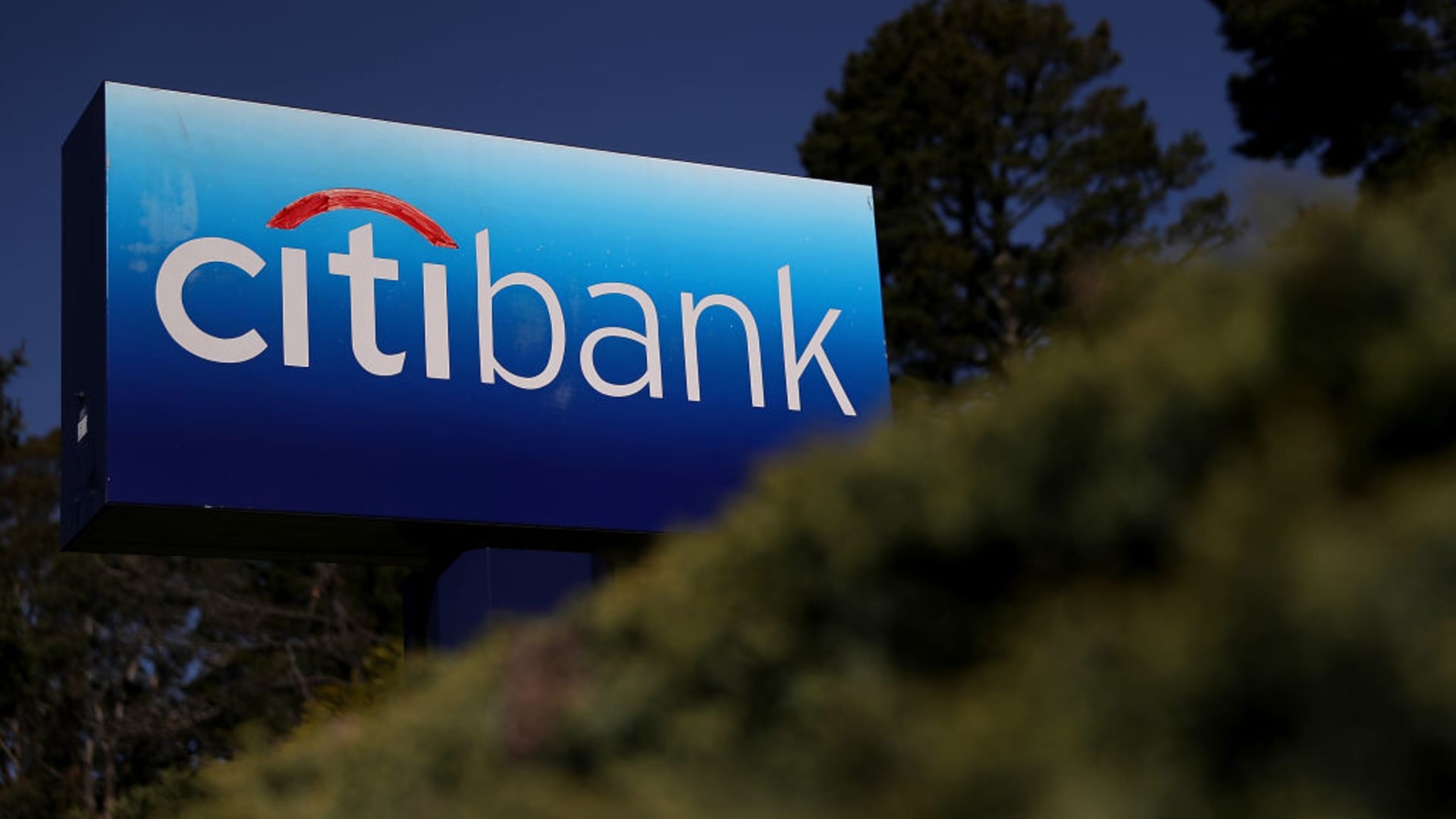Top Wall Street analysts say buy these dividend stocks for enhanced returns
5 min read
A Citibank sign in front of one of the company’s offices in California.
Justin Sullivan | Getty Images
The ongoing market volatility continues to add to investors’ woes, making it difficult for them to pick the right stocks.
However, it is always better to have a longer-term investment horizon and look for names that can enhance total returns with safe dividends and capital appreciation.
To that end, here are five attractive dividend stocks, according to Wall Street’s top experts on TipRanks, a platform that ranks analysts based on their past performance.
Ares Capital
This week we will first look at a high-dividend yield stock Ares Capital (ARCC). Ares is a business development company that offers a range of financing solutions to the middle market. The company recently reported a beat on third-quarter earnings, driven by higher interest rates and continued stable credit quality.
The company also declared a dividend of 48 cents per share for the fourth quarter, payable on Dec. 28. ARCC offers a dividend yield of 9.8%.
Commenting on the Q3 results, RBC Capital analyst Kenneth Lee noted that credit performance is still good, with loans on non-accrual status declining slightly quarter-over-quarter to a very low 1.2% of the portfolio (on an amortized cost basis). That said, he thinks that non-accruals could rise sometime next year.
The analyst highlighted other positives for Ares Capital, including portfolio diversification. The analyst also thinks that the company’s dividends are strongly backed by its core earnings per share generation and potential net realized gains.
Lee reiterated a buy rating on ARCC stock with a price target of $21 saying, “We still favor ARCC’s strong track record of managing risks through the cycle, well-supported dividends, and scale advantages.”
Lee ranks No. 251 among more than 8,500 analysts tracked by TipRanks. His ratings have been profitable 57% of the time, with each delivering an average return of 12.6%. (See ARCC Stock Charts on TipRanks)
Citigroup
Next on this week’s list is banking giant Citigroup (C). In October, the bank delivered better-than-anticipated results for the third quarter, fueled by strength in its institutional clients and personal banking units. Citi recently announced a massive reorganization that would simplify its operating model and enhance its business.
The bank announced a quarterly dividend of 53 cents per share, payable on Nov. 22. Citi’s dividend yield stands at 5%.
BMO Capital analyst James Fotheringham noted that Citi’s Q3 results were driven by higher-than-projected revenue (with net interest income coming in 5% above consensus), lower operating expenses, and reduced credit costs.
The analyst raised his core earnings per share estimates for 2023, 2024, and 2025 by 11%, 6%, and 3%, respectively, to reflect lower than previously-modeled credit costs and a slower-than-expected decline in net interest margin.
Fotheringham also increased his price target for the stock to $66 from $61 and reiterated a buy rating, saying, “C is our top pick among large-cap banks; shares trade at the largest discount (by far) to TCE [total capital employed] among the money-center banks.”
Fotheringham holds the 372nd position among more than 8,500 analysts on TipRanks. Moreover, 56% of his ratings have been profitable, with each generating an average return of 9.4%. (See Citigroup Blogger Opinions & Sentiment on TipRanks)
McDonald’s
Dividend aristocrat McDonald’s (MCD) recently reported its third-quarter results. The fast-food chain exceeded Wall Street’s expectations, thanks to higher prices that helped offset weakness in the traffic at U.S. restaurants.
In early October, MCD announced a 10% hike in its quarterly dividend to $1.67 per share, which will be payable on Dec. 15. The company has increased its dividends for 47 consecutive years. The company pays a dividend yield of 2.5%.
BTIG analyst Peter Saleh, who ranks No. 667 among more than 8,500 analysts on TipRanks, highlighted that the sales and earnings upside in MCD’s Q3 results was coupled with rather cautious comments about the U.S. traffic. Traffic had declined slightly due to reduced frequency from lower-income customers and pressure in the “breakfast daypart.”
Nonetheless, the analyst noted that MCD still experienced wide geographic strength and remains better positioned than its rivals. Looking ahead, Saleh expects the company to accelerate its U.S. expansion next year, with his checks indicating that MCD has about 250 units in the pipeline. He also expects the company to have a greater focus on value and digital engagement, as well as an expansion of its automated order-taking technology in 2024.
“We view McDonald’s as one of the strongest restaurant concepts in the world that is in the middle stages of a multi-year sales recovery,” said Saleh.
Saleh reiterated a buy rating on McDonald’s stock with a price target of $300. His ratings have been successful 52% of the time, with each rating delivering an average return of 7.9%. (See McDonald’s Financial Statements on TipRanks)
AT&T
We now move to telecommunications giant AT&T (T), which impressed investors by reporting robust subscriber additions for the third quarter, thanks to promotions and phone upgrades. Furthermore, the company raised its full-year free cash flow guidance to about $16.5 billion from $16 billion. AT&T offers an attractive dividend yield of 7%.
On Oct. 26, Tigress Financial Partners analyst Ivan Feinseth reiterated a buy rating on AT&T stock with a price target of $28. The analyst highlighted that the rise in Q3 subscribers and cash flow mark a significant turn in AT&T’s business performance trends.
He added that while 2022 was a transitional year, the company’s revenue, cash flow and profitability will rise significantly in 2023 and beyond, with the long-term growth driven by ongoing 5G and broadband rollout in business communications.
“AT&T will increasingly leverage its 5G high-speed fiber network to drive ongoing subscriber growth and further enhance its Edge Computing capabilities,” said Feinseth.
The analyst noted that AT&T reduced its debt by over $3 billion in Q3 2023, which would reduce interest expense and drive higher investment in its connectivity business. He thinks that the company will further optimize its dividend payout ratio such that it can support ongoing investments while returning cash to shareholders.
Feinseth holds the 453rd position among more than 8,500 analysts on TipRanks. Moreover, 54% of his ratings have been successful, with each generating an average return of 8.2%. (See AT&T Hedge Fund Trading Activity on TipRanks)
Target
Feinseth is also bullish on another dividend stock: big-box retailer Target (TGT). The analyst thinks that near-term pressures create an attractive opportunity to buy the stock, as the company is well-positioned to drive revenue growth and profitability over the long term and further enhance shareholder value.
The analyst expects Target’s multiple strengths — including its loyal customer base, operating efficiencies and enhanced fulfillment capabilities — to help it navigate ongoing consumer headwinds, marketing errors and inventory shrink troubles.
Feinseth also highlighted that the retailer is enhancing its product offerings by adding several new products across its major product lines. It is also expanding its footprint by opening new stores while remodeling existing ones. (See Target Insider Trading Activity on TipRanks)
He pointed out that TGT initiated its dividend in 1967 and has increased its dividend annually since 1971. In June 2023, the company raised its quarterly dividend by about 2% to $1.10 per share, following a massive 20% increase in June 2022 to $1.08 per share. TGT’s dividend yield stands at 3.9%.
Feinseth lowered TGT’s price target to $180 from $215 due to near-term challenges but maintained a buy rating, saying, “Increasing value focus in consumer spending trends, and moderation in inflationary pressures and input costs, will drive a reacceleration in Business Performance trends.”







